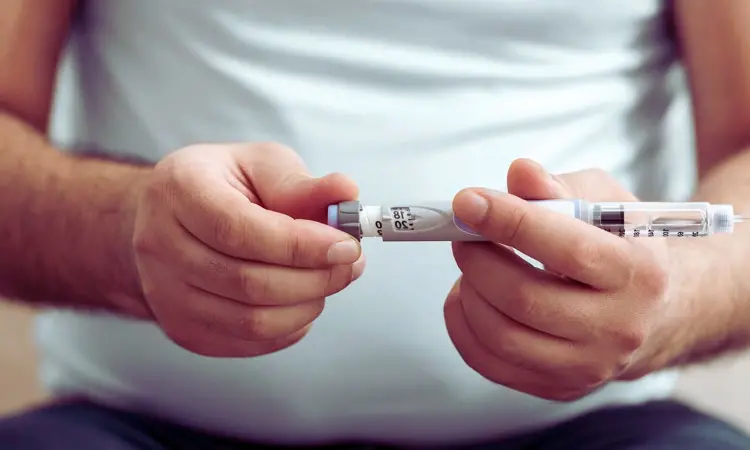- Home
- Medical news & Guidelines
- Anesthesiology
- Cardiology and CTVS
- Critical Care
- Dentistry
- Dermatology
- Diabetes and Endocrinology
- ENT
- Gastroenterology
- Medicine
- Nephrology
- Neurology
- Obstretics-Gynaecology
- Oncology
- Ophthalmology
- Orthopaedics
- Pediatrics-Neonatology
- Psychiatry
- Pulmonology
- Radiology
- Surgery
- Urology
- Laboratory Medicine
- Diet
- Nursing
- Paramedical
- Physiotherapy
- Health news
- Fact Check
- Bone Health Fact Check
- Brain Health Fact Check
- Cancer Related Fact Check
- Child Care Fact Check
- Dental and oral health fact check
- Diabetes and metabolic health fact check
- Diet and Nutrition Fact Check
- Eye and ENT Care Fact Check
- Fitness fact check
- Gut health fact check
- Heart health fact check
- Kidney health fact check
- Medical education fact check
- Men's health fact check
- Respiratory fact check
- Skin and hair care fact check
- Vaccine and Immunization fact check
- Women's health fact check
- AYUSH
- State News
- Andaman and Nicobar Islands
- Andhra Pradesh
- Arunachal Pradesh
- Assam
- Bihar
- Chandigarh
- Chattisgarh
- Dadra and Nagar Haveli
- Daman and Diu
- Delhi
- Goa
- Gujarat
- Haryana
- Himachal Pradesh
- Jammu & Kashmir
- Jharkhand
- Karnataka
- Kerala
- Ladakh
- Lakshadweep
- Madhya Pradesh
- Maharashtra
- Manipur
- Meghalaya
- Mizoram
- Nagaland
- Odisha
- Puducherry
- Punjab
- Rajasthan
- Sikkim
- Tamil Nadu
- Telangana
- Tripura
- Uttar Pradesh
- Uttrakhand
- West Bengal
- Medical Education
- Industry
GLP-1RAs Show Promise for Kidney Protection in Type 2 Diabetes, Reveals Research

Italy: A new review published in Minerva Medica has revealed that GLP-1 receptor agonists may help preserve kidney function in people with type 2 diabetes.
Researchers led by Alessandro Perencin from the Department of Medicine (DIMED), Geriatrics Division, University of Padua, Italy, conducted a systematic review to examine whether this class of diabetes medications could provide direct kidney benefits. GLP-1 receptor agonists (GLP-1RAs) are already widely prescribed for blood sugar management and cardiovascular protection, but their potential to safeguard kidney health has not been comprehensively evaluated until now.
To assess this possibility, the team performed an extensive search of medical literature across databases such as PubMed, Embase, Web of Science, and the Cochrane Library. They looked for studies that reported kidney-related outcomes—specifically estimated glomerular filtration rate (eGFR), a key measure of kidney function, and albumin-to-creatinine ratio (ACR), an indicator of protein leakage in the urine—in adults with type 2 diabetes who were treated with GLP-1RAs. Each study was carefully reviewed for quality and risk of bias to ensure reliable conclusions.
Thirteen studies, including both randomized clinical trials and observational analyses, met the inclusion criteria. These investigations suggest that GLP-1RAs may slow the progression of kidney damage, reduce proteinuria, and improve other important markers of renal health in patients with diabetes. Several studies showed significant slowing of eGFR decline and reductions in ACR, pointing to a possible protective effect against diabetic kidney disease.
However, the evidence was not entirely consistent. While some studies demonstrated clear and measurable benefits, others reported only modest improvements or no significant impact on kidney function. Differences in study design, patient populations, and treatment duration may partly explain these mixed results.
Despite these variations, the authors underscore that the overall trend is encouraging. With diabetic kidney disease remaining a major cause of chronic kidney failure worldwide, therapies that can both control blood glucose and support kidney health are urgently needed. GLP-1RAs—already known to lower cardiovascular risk—could offer an added advantage by helping to preserve renal function over time.
The review calls for larger, well-structured clinical trials to confirm these preliminary findings and to clarify how GLP-1RAs exert potential nephroprotective effects. Establishing clear evidence could help physicians decide when and how to incorporate these drugs into treatment plans for people with type 2 diabetes who are at risk of kidney complications.
"The systematic review highlights the emerging role of GLP-1 receptor agonists as more than just blood sugar–lowering agents. While further research is necessary, these medications may one day become a cornerstone not only in managing type 2 diabetes and cardiovascular disease but also in protecting long-term kidney health," the authors concluded.
Reference:
Perencin A, Ceolin C, Papa MV, Di Marzio B, Zanforlini BM, Devita M, et al. Glucagon-like peptide-1 receptor agonists and its possible nephroprotective role: a systematic review. Minerva Med 2025 Sep 11. DOI: 10.23736/S0026-4806.25.09709-5
Dr Kamal Kant Kohli-MBBS, DTCD- a chest specialist with more than 30 years of practice and a flair for writing clinical articles, Dr Kamal Kant Kohli joined Medical Dialogues as a Chief Editor of Medical News. Besides writing articles, as an editor, he proofreads and verifies all the medical content published on Medical Dialogues including those coming from journals, studies,medical conferences,guidelines etc. Email: drkohli@medicaldialogues.in. Contact no. 011-43720751
Next Story


